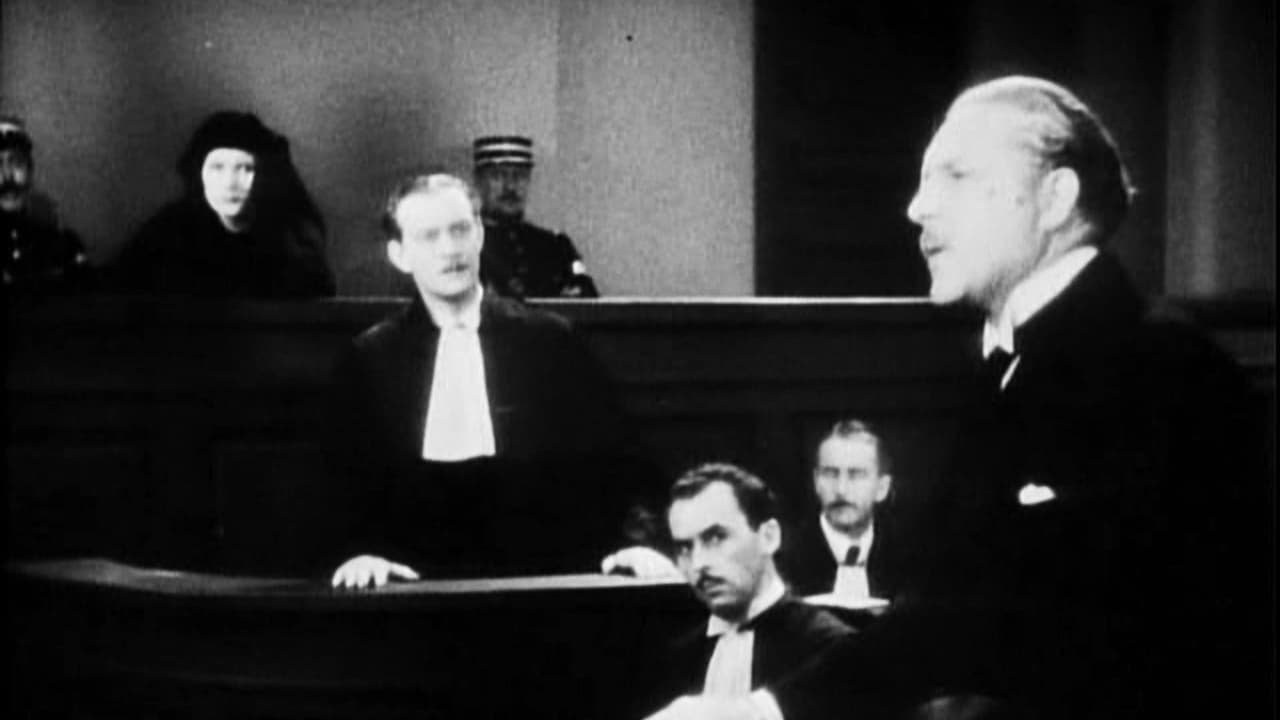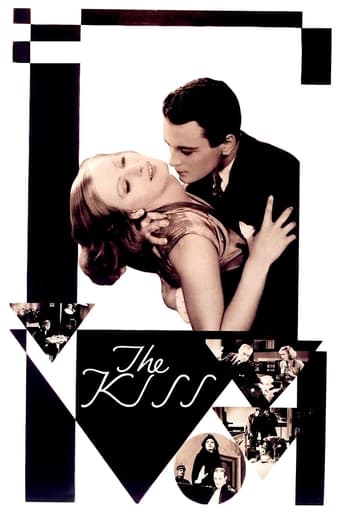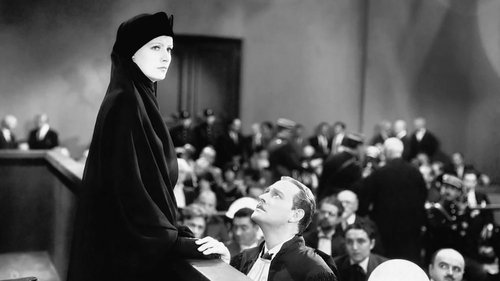


Most undeservingly overhyped movie of all time??
... View MoreGood concept, poorly executed.
... View MoreExcellent and certainly provocative... If nothing else, the film is a real conversation starter.
... View MoreWorth seeing just to witness how winsome it is.
... View More"The kiss" took the melodramatic accents of Feyder 's precedent work " Les Nouveaux Messieurs"and tightened them up;whereas that work should have been boiled down to a 90 min movie, "the kiss" depicts a tragedy in admirably succinct style :only 62 min,a very good screenplay which does not reveal the whole truth before the last minutes.It's the classic story of the divine lady married with a graybeard without love ,in love with a more handsome gent;add a young man,pretending to be a man (the subject of the immature young lad will come back later in Feyder 's career in " Pension Mimosas")and all the ingredients of a good melodrama are in it.In Hollywood,Feyder accurately depicted his native land:in jails for women ,the wardens were nuns (in 1960 ,in Clouzot's "La Vérité" ,Brigitte Bardot was guarded by sisters too);and the gendarmes' uniforms are exactly as they were.After this successful work (which owed a lot to G.Garbo in her last silent movie) ,Feyder was disappointed with the screenplays left for him to direct and he came back to his native land and produced his greatest achievements :"Le Grand Jeu" ,"Pension Mimosas" and his masterpiece "La Kermesse Héroique".
... View MoreI often see stills from this movie accompanying articles about art direction of the 1920s. Stressing the claustrophobic ceilings and the pointed triangular furniture where Irene (Garbo) lives with her husband (Anders Randolph) with whom she is caught in a loveless marriage, the extreme surroundings mirror their tense lives. MGM embraced the stark modernistic Art Deco style, their films were always aimed at the wealthier members of the audience or the poor audiences that envied the rich. The "average" MGM family of the 20s were usually wealthy, who lived in a mad whirl of parties, often taking place on yachts ("Our Dancing Daughters" is a good example).In my opinion, along with "A Woman of Affairs", this is my favourite Garbo film. It was her last silent - released late in 1929 and once again she gave a strong, mesmerizing performance even though the men in the movie (Conrad Nagel, Anders Randolph, Lew Ayres) lacked dynamism and at just over an hour an extraordinarily short running time for a Garbo film.Irene (Garbo) is having a very discreet affair with Andre (Nagel), she begs him to take her away but he is concerned for her reputation and wants to confront her husband, blustering, quick tempered Charles (Anders Randolph - yes Anders Randolph - how did that ever happen, was she in a daze until their honeymoon!!!) - who is not above having Irene tailed!! The only thing of interest the "trailer" has in his book is the amount of time Irene spends with young Pierre (Ayres) who just happens to be her messenger boy and dog handler. Unbeknownst to everyone Pierre is infatuated with Irene. Charles is on the verge of bankruptcy but LaSalle, Pierre's father offers to bail him out, however on the way to the meeting Charles suffers a slight heart attack and instructs his driver to return home. He walks right in on a playful kiss between Irene and Pierre but by the end of the evening Charles is dead and Pierre has staggered home, dishevelled and bloody.The last part of the movie has a couple of innovative sequences. When Irene is questioned by the detectives she is hesitant and changes her story, but the viewer sees it in flashback - are the windows open, no they are closed, what time was it - the clock hands go haywire and instead of 9.30 pm it is now 9.10 pm - she constantly stumbles, recollects and fabricates. At the trial (Andre has returned to represent her) her stark black Adrian designed hat almost turns her into an Art Deco decoration as she is photographed from below, sitting in the witness box.Lew Ayres made a spontaneous, eager Pierre. He was a protégé of Paul Bern and had had a bit part in "The Sophomore" but when Bern moved to MGM he thought of Lew for the role of the youthful Pierre in "The Kiss".
... View MoreTHE KISS (Metro-Goldwyn-Mayer, 1929), directed by Jacques Feyder, goes on record as the last silent movie for both the studio and its popular leading lady, Greta Garbo. Released near the close of the year when talkies were the talk, or in other words, the rage of the movie business, MGM took a gamble on continuing on making product of silent movies that's now considered passé, and keeping the Swedish temptress from appearing in a talkie until finally "Garbo Talks" in the highly popular ANNA Christie (1930). What's even more common up to this point was casting Garbo as an unfaithful woman married to a middle-aged man involved with one closer to her own age. For THE KISS, two young men, screen veteran Conrad Nagel, and newcomer Lew Ayres. While MGM might have placed the versatile Lewis Stone as the older husband, having done so with Garbo in WILD ORCHIDS (1929), Anders Randolf became the final choice. He acts his part with further conviction than Stone would have if he played the part. For a ordinary story (by George M. Seville) that could have taken place anywhere from New York to Tahiti, the setting for THE KISS is in Lyons, France. It's uncertain if the leading players are characters of French descent, but if so, maybe it's a good thing that THE KISS is a silent film since it's a hard to imagine the Swedish Garbo speaking with a French accent? As for the screenplay (credited to Hans Kraly), the story opens at the Museum of Fine Arts where Irene Guarry (Greta Garbo) is meeting secretly with Andre Dubail (Conrad Nagel), her lover. Andre wants Irene to divorce her husband, Charles (Anders Randolf), a silk merchant whose business prevents him from giving his wife the full attention she desires. Fearing of his jealous nature if the two men should meet, and unable to come up with a possible solution, Irene and Andre decide to part company. Returning to her usual lifestyle and social functions, Irene attends one given by her husband's business partner, Lassalle (Holmes Herbert), whose 18-year-old son, Pierre (Lew Ayres), has a crush on her. Suspecting Irene to be unfaithful, Charles hires Durant (George Davis), a detective, to trail her. During the investigation, Durant finds Irene constantly in the company of Pierre, in reality to be all very innocent. One night while Charles to assist Lassalle, whose on the verge of bankruptcy, Pierre comes over to visit with Irene, who had promised him a picture of herself to take with him upon his return to school. Discovering they are alone, Pierre forces himself on Irene with a passionate kiss at the very moment Charles returns to catch them together. As the irate husband beats the frightful youth senseless, Irene suddenly grabs her husband's revolver and off camera fires a shot. Because the police find contradictions in her story, Irene is arrested to later face a murder trial with her former lover, Andre, as her attorney.An acceptable melodrama of the soap-opera school made interesting by its lengthy courtroom climax consisting of various points of views told via flashback depicting what occurred the night of the murder. Aside from such notable camera angles and stylish sets, along with added sound effects of the telephone ringing and a gunshot noise, there's also wonder what secret Irene is holding back from her attorney and what the verdict will be, a common practice in many trial stories.While THE KISS is sometimes credited at 89 minutes, circulating prints available either on the old 1990s VHS format or on cable television's Turner Classic Movies have the running time of 62 minutes, which obviously was the one distributed in theaters since there seems to be no indication of severe editing nor sudden fade-outs. Containing a musical track conducted by Dr. William Axt, its only drawback is its repetitious use of Tschiakowski's love theme composition for "Romeo and Juliet." Other than that, this is typical Garbo of the 1920s that should still be of some interest today and the film for which she kisses goodbye to the art of silent movie making.(**)
... View MoreMarried socialite Garbo gives an innocent kiss to a younger man Ayres who is infatuated with her, which conveys to the mysterious murder of her husband. Absurd, but entertaining drama was Garbo's and MGM's final silent, and is notable as Ayres first feature film. Contains music score and some sound effects.
... View More